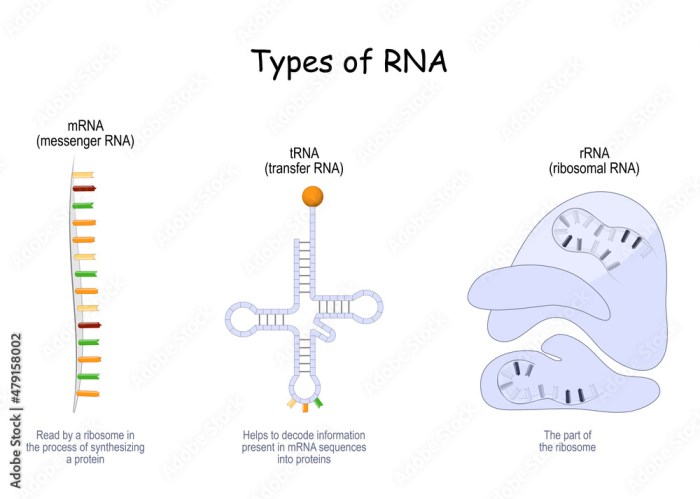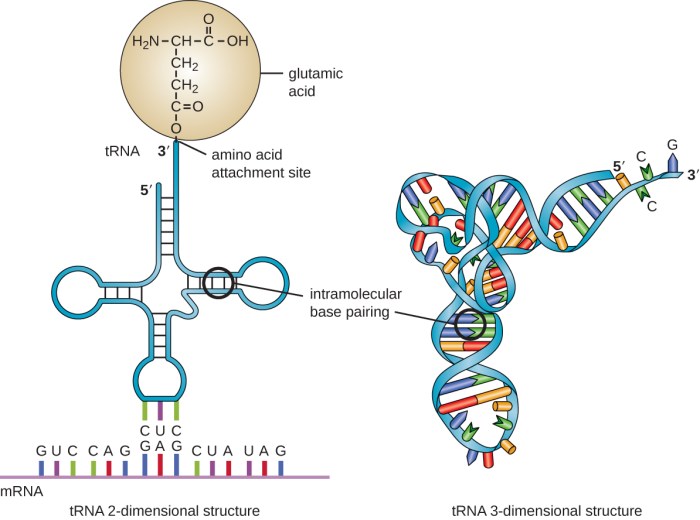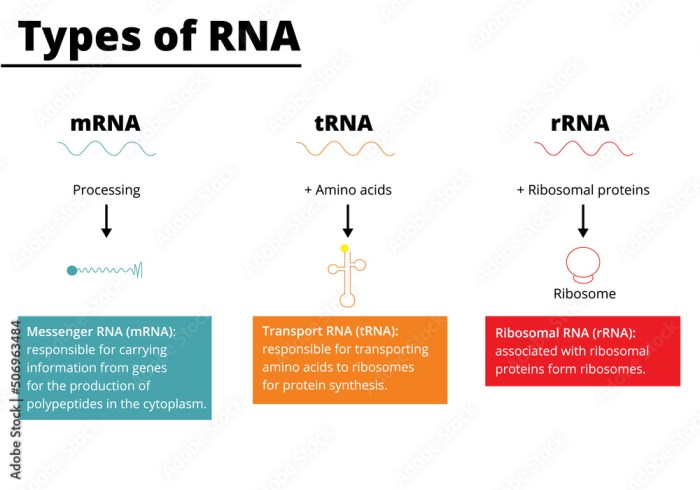Match the types of rna with their function – In the realm of molecular biology, RNA molecules play a pivotal role in various cellular processes. Understanding the different types of RNA and their specific functions is crucial for unraveling the complexities of gene expression and protein synthesis. This guide delves into the intricacies of RNA molecules, exploring their structure, characteristics, and the diverse roles they perform within the cellular machinery.
The primary types of RNA molecules include messenger RNA (mRNA), transfer RNA (tRNA), and ribosomal RNA (rRNA). Each type possesses a distinct structure and set of functions, contributing to the overall efficiency and accuracy of gene expression. mRNA carries the genetic code from DNA to the ribosomes, where it serves as a template for protein synthesis.
tRNA molecules act as intermediaries, transporting amino acids to the ribosomes in the correct order specified by the mRNA sequence. rRNA, the most abundant type of RNA, forms the structural framework of ribosomes, facilitating the assembly of proteins.
Types of RNA

RNA (ribonucleic acid) is a type of nucleic acid that plays a crucial role in protein synthesis and other cellular processes. There are three main types of RNA molecules: messenger RNA (mRNA), transfer RNA (tRNA), and ribosomal RNA (rRNA).
mRNA (Messenger RNA)
mRNA carries the genetic information from DNA to the ribosomes, where protein synthesis occurs. It is a single-stranded molecule that is complementary to one of the DNA strands. mRNA is synthesized in the nucleus and then transported to the cytoplasm, where it binds to ribosomes and serves as a template for protein synthesis.
tRNA (Transfer RNA), Match the types of rna with their function
tRNA molecules are responsible for transferring amino acids to the ribosomes during protein synthesis. Each tRNA molecule is specific for a particular amino acid and has an anticodon that is complementary to the codon on the mRNA molecule. tRNA molecules are synthesized in the nucleus and then transported to the cytoplasm, where they participate in protein synthesis.
rRNA (Ribosomal RNA)
rRNA molecules are the structural components of ribosomes. They are responsible for catalyzing the formation of peptide bonds between amino acids during protein synthesis. rRNA molecules are synthesized in the nucleolus and then transported to the cytoplasm, where they assemble into ribosomes.
Key Questions Answered: Match The Types Of Rna With Their Function
What is the primary function of mRNA?
mRNA carries the genetic code from DNA to the ribosomes, serving as a template for protein synthesis.
How do tRNA molecules contribute to protein synthesis?
tRNA molecules transport amino acids to the ribosomes in the correct order specified by the mRNA sequence.
What is the structural role of rRNA?
rRNA forms the structural framework of ribosomes, facilitating the assembly of proteins.


